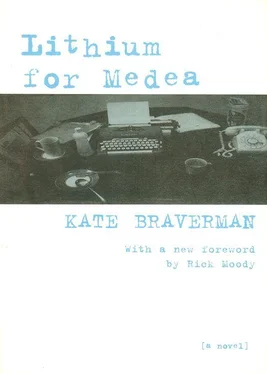“I’ll never trust you after this,” he screamed from the hallway. He had four pillowcases in his hands. “I wouldn’t trust you to sleep in the same house. Ever.”
September came suddenly. In one day the interminable thick summer disappeared. It was cold. It rained. Even the trees in the yard below me, even the cars slowly casting their white headlights into the darkness, looked cold. Night had icy fingers. A black wind blew off the bay. I would run my fingertips across my breasts. Nothing lived inside. Inside was gray space, gray tiled corridors, narrow and dark, all straight and all leading absolutely nowhere.
Gerald returned for his mail. I didn’t know where he was living. He refused to tell me. He still had a key to the apartment. Sometimes I would return from work and find another sign that Gerald had been there — a new patch of emptiness in the bookcase, a new slot in a closet where camping gear had once been folded.
When Gerald entered the apartment he was stiff and silent. His eyes darted back to the edges of the room, as if looking for threatening omens. He refused to share a pot of tea with me. I could feel him staring at me, searching for the correct nomenclature. Why, of course. A new category. Barefoot I was a small dark thing, a subspecies not reaching his chin. I was a kind of spider woman, dark and less than human, spinning threads through his torso, his pale chest.
He had come for his letters, and only his letters. He crossed the room carefully, as if the floor was filled with land mines. He avoided the bookcase shadows, the dark accusing glance of old titles, the lying threads of some other life. He stood in the doorway detached and tense, tearing his envelopes open. They were secret documents now consumed on the far side of the room, then folded and shoved into his pockets. He was gathering momentum.
“I wish I’d never met you,” he said. “You’ve ruined my life. You tried to kill me.”
His eyes were very dark. His big square hands with the new black ridges cut in his fingers by the guitar strings seemed to flap angrily at his side.
“I wish you were dead. I wish somebody would kill you,” Gerald said. He was standing near the door. I stood on the far side of the room. Not even our shadows collided.
Gerald turned back once. He looked as if he wanted his fingerprints back and the drops of water from the shower. Then he opened the door. He shut the door. I never saw him again.
That year I would be twenty-one. Winter engulfed me. I committed to memory the periphery, the red enamel walls, the piece of overgrown yard below, the orange globes of streetlamps on Shattuck Avenue and the tiny balcony where I had once fed blue jays and where I stood now, in the wind-driven rain, letting the night pick at my face.
There was the matter of hard evidence. I knew I would never order the pieces. In time, the foundations would rot and the facts would grow wings and float through me. Gerald was gone. I would never understand. Gerald had been the student. I had studied him.
I walked back into the hospital. I found Francine in the cafeteria. She was sitting alone, staring at a round wall clock. Her amber eyes, eyes like slabs of yellow agate, were blood red from crying.
“I thought you’d run away. That’s what you’re good at, kid. And always when I need you the most. Oh, what’s the use? You’re strictly six,” Francine said.
She meant I could run only six furlongs. Stakes races are longer. A mile and an eighth. A mile and a quarter. It wasn’t enough to sprint. A great horse had to go the longer distances.
We sat in silence. Later we paced the corridor in front of the operating room. Much later the doctor came out. His hands trembled.
“It was touch and go.” The doctor pushed past us toward the elevator. “Touch and go. But I think we got it all.” He meant the cancer.
“What about now?” Francine followed the surgeon. He walked faster but she caught up with him. She grabbed his arm. She brought her face very close to his. Tears spilled down her cheeks.
“He’s resting. I suggest you do the same.” The elevator doors swung shut.
Francine and I looked at one another. Then we walked out to the parking lot. The air was very cold.
“I know he’s going to die tonight. Trust my intuition. He’s dying right now. I can feel his life force leaking out. Oh, God, help me.”
I held Francine for a moment. She looked startled, almost embarrassed. Then she turned her face away. As I drove home, I kept thinking of her face, pale and frightened, skin white as a sheet draped over a dead man.
I waited for the hospital to call, formal and polite, crisp white words saying the man you call father is dead. Clear white words polished and hard, glistening, horrible, a kind of marble. He hemorrhaged. There was a sudden uncontrollable infection. White words like white stones, gravestones.
I waited. Nothing. Silence.
It was night, definitely night. The shadow battle had ended. The sun climbed back into Santa Monica Bay. The sun was a useless thing lying on the cool sandy ocean floor, eyeless and poisoning fish.
I turned on lights, trying to obliterate the night. I walked through the rooms of my house, the Woman’s House, where I have lived six years watching the special seasons of the canals, the silver and grease-yellow, the abundant and quick-tongued shadows, the gray fog and sullen thickening brown edging into ink. For six years I have witnessed the water in front of my house, now churning, now changing, completing some cycle meaningful only to itself.
Suddenly the rooms of my house looked different, as if they were soft, as if they lacked edges and spines. As I paced the rooms of my house, I felt a chill. The chill was within. Something was stirring, beating strong wings and creating a current, a soft cooling wind. It seemed to grow, continually more urgent, insistent, something opening within, like a flower. And I thought, I am twenty-seven years old and a pine tree my age knows more. And I thought maybe this enormous opening flower should be named Rose.
I walked through my house, through the odd familiar rooms, opening closets and drawers, picking up objects at random like an amnesiac. I found myself holding an album of photographs. I found myself staring at Gerald.
Gerald had been a wound, cauterized and sealed shut, all in a limited way. Now it was somehow breaking loose, leaking out like blood. (Like my father’s blood?) The passage of time had done nothing to alleviate the pain. Time merely softened certain essential edges. Things blurred. There was a loss of resonance, a slow irretrievable spillage.
I turned the album pages slowly. Each frame was clear, so clear it must have been autumn in Berkeley, the sharp Northern California fall when the wind blows hard, sweeping away the residues, the layers and veils that seem to separate faces and fence slats from another, more fragile reality.
I am standing in front of a polar bear cage in the San Francisco zoo. Wind blows. The picture was taken during a time when Gerald had to go to the zoo each day for a class on primate social behavior. He took notes on various animal interactions. He had a special notebook in which he assigned the gorillas and orangutans names like Alpha Male or Juvenile and marked down each time they had dominance interactions or engaged in aggressive displays.
“Don’t stare at me,” Gerald had screamed, suddenly whirling around and facing me.
He had been going to the zoo every day for weeks. He refused to allow me to accompany him. Finally, on a day so clear, so perfectly etched, that even Gerald sensed a promise in the pale sunlight, he relented. “Just don’t say a single word, not one,” he cautioned.
I had left him in front of the gorilla enclosure and wandered through the zoo by myself. In the photograph I look directly at the camera. I look happy. I hadn’t rushed into the North Beach night yet. Who took the photograph?
Читать дальше












